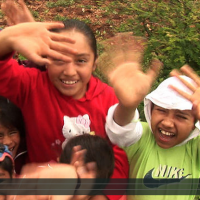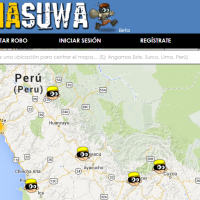Let's Rise! [1] from Global Voices [2] on Vimeo [3].
From the Blog
Using the Left Brain to Teach the Right: Visual Computer Programming – [5]Scratch is a programming language designed for use by educators and young people to teach the building blocks of computer programming. It is a visual, block-based, computer programming language editor available in 40 languages.
guifi.net, Spain's Wildly Successful DIY Wireless Network [6] – At any given moment in Spain, there are thousands of people surfing the Internet. But more and more Spaniards are opting for a kind of parallel Internet, one that avoids the high costs of commercial Internet Service Providers and bridges the digital divide.
Story-Making Machines: Meograph – [4]Rising Voices republishes an interview conducted by Transom.org, who spoke with Misha Leybovich, the founder and CEO of Meograph – “Four-dimensional storytelling”.
Sanskar, Harmony Through Acceptance [7]- Bridging cultural differences through understanding, Sanskar is a new interactive app to teach through gaming.

Screenshot of a videocartas, made by young Oaxacans
Peru: Collective Collaboration to Generate Public Safety Data [8] – The goal of Amasuwa is to use crime data to create maps of unsafe areas in Peru and to alert the public to crime-heavy places.
Sending Video Letters from Oaxacan Indigenous Communities [9]- Video letters are a way for children in isolated indigenous communities in Oaxaca to show some of their favorite things in their village and to connect with others around the world through the power of video.
In the news
Nouchi is a coded language that originated in the 70′s in Côte d'Ivoire to protect communication between street hustlers away from the police forces. Now, many Ivorian politicians have incorporated some of the most popular expressions in their speeches. Read more on Global Voices [10].
Defining media literacy [11] in the digital age, with a look at a viral Cambodian television program
Special coverage of blogging in the Caucasus [12] on Global Voices.
This month's Digital Citizen [13] is out! Read about human rights and technology in Tunisia, Syria, Saudi Arabia, UAE and Yemen http://bit.ly/18SI961 [14]
Opportunities and Competitions [11]

Crowdsourced map of crimes in Peru: collaborative data for public safety
Special Award out from One World Media for an independent media organisation in the developing world – no entry fee, enter now: http://bit.ly/19lvzqa [15]
Call for Proposals – EIFL Public Library Innovation Grants – [16]Public and community libraries in developing or transition economy countries are invited to apply for the EIFL's Public Library Innovation Programme (EIFL-PLIP) grants.
2014 Access Facebook Award: US$10,000 will go to the project that best uses the Facebook platform to deliver a human rights or social good outcome http://bit.ly/1k9Mbck [17]
Did you know about the upcoming Fiction series from Mashalla? The invite writers – aspiring or established – to imagine alternative fates for what is, at present, a complicated Middle East. Read the submissions call – http://eepurl.com/Kgmv9 [18]
Projects to check out…FTX – Feminist tech exchange [19]and the Launch of Macedonian Platform for Mapping of Violence – the campaign focused on the power of technology to influence public awareness about this problem.